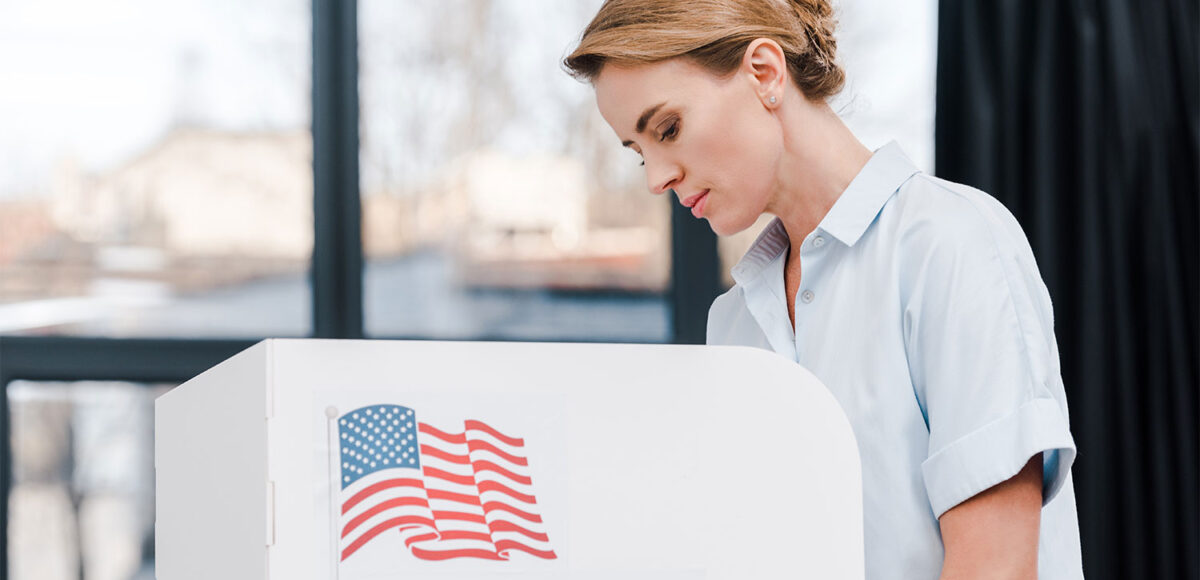With fewer than 20 days left before the election, anxiety is on the rise. This isn’t a new phenomenon, but it has intensified in recent years as political discourse has grown increasingly polarized and the aftermath of the 2020 election replays in our minds. This anxiety is driven by fear of the unknown, a lack of control over the future, and the high stakes that elections represent. Many feel that the outcome may directly affect their personal lives, the state of the country, the future of democracy and the global landscape. For many, the election feels deeply personal. Whether it’s concern about healthcare, climate change, economic inequality, or social justice, voters may feel that their values and livelihoods are on the line. The more personally invested someone is in the outcome, the more anxious they are likely to feel. The events following the 2020 election, and the two recent assassination attempts demonstrate how volatile our county has become further raising our collective anxiety.
Although election anxiety is a common experience in today’s politically charged environment, it doesn’t have to topple your emotional well-being. By understanding the factors that contribute to this anxiety and adopting effective coping strategies, you can navigate the upcoming election with greater emotional balance. Remember to focus on what you can control, engage in self-care, and seek support when needed. The election will come and go, and your mental health should remain a priority throughout the process.
One of the most effective ways to manage anxiety is to redirect your focus toward what you can control. By taking action in meaningful ways, you can restore a sense of agency and reduce the feeling of helplessness.
1. Vote Early or By Mail
Taking the step to vote early or by mail (if your state allows it) can reduce some of the anxiety surrounding Election Day. Voting early allows you to avoid the crowds and potential stressors associated with long lines or the possibility of Election Day disruptions. Once your vote is cast, you may feel a greater sense of relief, knowing you’ve done your part.
If you’ve already voted, you can use this opportunity to encourage others to do the same. Whether it’s reminding friends and family or volunteering to help others navigate the voting process, you’ll feel more engaged and proactive, lessening the stress of waiting for the final outcome.
2. Volunteer or Get Involved in Civic Engagement
Another way to regain a sense of control is by actively participating in civic engagement. Volunteering for a political campaign, local elections or nonpartisan voter turnout efforts or on Election Day can give you a constructive outlet for your energy over this final stretch. By contributing in these ways, you shift your attention away from the things that are outside your control and toward positive actions that can make a real difference. Even small contributions to civic life help empower you and create a sense of shared purpose.
3. Focus on Your Own Circle
In addition to engaging with the larger election process, you can focus on your immediate circle—your friends, family and community. Sharing helpful and fact-based information about the voting process with those close to you can empower others and strengthen your connections. Conversations with friends and family about voting, civic responsibility, or even the values that matter most to you can help create a sense of collective action.
While it’s tempting to argue or debate political opinions, especially on social media, these exchanges often escalate into more anxiety and division. Instead, focus on constructive and empathetic dialogue that acknowledges differences while seeking common ground. By fostering a supportive environment in your close relationships, you can reduce the pressure of political differences and focus on shared values.
4. Prepare for Post-Election Plans
Although the outcome of the election is beyond your control, you can make plans for what you will do afterward, regardless of the result. Preparing yourself mentally and emotionally for different scenarios can help reduce anxiety by giving you a roadmap to follow.
• If the results align with your hopes, consider how you will celebrate or take a moment to reflect on the outcome.
• If the results are not what you hoped for, think about how you will cope, including seeking support from friends, taking time for self-care, and engaging in actions that reflect your values moving forward.
Being mentally prepared for different outcomes doesn’t mean resigning yourself to a negative result, but rather acknowledging that, whatever happens, you have the resources and resilience to manage it.
5. Plan for Election Night and Beyond
Election night itself can be one of the most anxiety-inducing moments in the entire election cycle. As results start to roll in, emotions often run high, and the tension can feel overwhelming. To help alleviate some of this pressure, it’s important to have a plan in place for how you will manage election night and the days that follow. Taking proactive steps to create a supportive, calming environment can make all the difference in how you experience this potentially stressful time.
6. Set Boundaries on Media Consumption
One of the most important steps you can take is to decide in advance how much media coverage you will consume on election night. While it may be tempting to stay glued to the TV or check your phone constantly for updates, this can fuel anxiety. Election results often come in slowly, and with uncertainty around how long it may take to tally votes, especially with mail-in ballots. It’s easy to get caught up in the minute-to-minute updates.
Follow reputable sources: If you choose to stay informed throughout the night, stick to trustworthy, fact-based news outlets. Avoid sensationalist or inflammatory media that tends to heighten anxiety. Turn off social media notifications or mute specific accounts that you know will be overwhelming. Social media often amplifies anxiety as people react in real time with strong emotions, which can make your own feelings of stress worse.
7. Create a Calming Environment
To counterbalance the emotional intensity of election night, intentionally set up your physical space to promote calm and relaxation. Here are a few ways to do this:
• Lighting and ambiance: Soft lighting, candles or relaxing music can create a soothing atmosphere that helps you feel more grounded.
• Comforting activities: Engage in activities that you find comforting, such as knitting, cooking, drawing or reading a book. Having something to focus on that isn’t related to the election can help keep your mind occupied.
• Mindfulness practices: Consider practicing meditation, deep breathing or yoga throughout the evening to manage your stress response. Apps like Headspace or Calm can guide you through short mindfulness exercises when you need them most.
8. Surround Yourself with Supportive People
Consider spending some or all of election night with supportive friends or family members who share your values and can provide emotional support. Whether in person or via video chat, being with people who understand your concerns can help reduce feelings of isolation. Together, you can create a supportive, non-anxious environment where emotions can be shared but not escalated.
Alternatively, if you know that election night will be stressful with certain individuals (due to political disagreements or heightened emotions), it may be better to watch the results alone or with others who won’t increase your anxiety. If you do find yourself feeling triggered by certain conversations, take a step back and set boundaries. Politely disengage and remind yourself that it’s okay to prioritize your mental health over political arguments.
9. Be Ready for Uncertainty
It’s important to prepare yourself for the possibility that election results may not be immediately clear. With the rise in mail-in ballots and the potential for recounts or legal challenges, final results may take days or even weeks to be confirmed. This uncertainty can prolong the feelings of anxiety, but acknowledging this possibility ahead of time can help you mentally prepare.
During this period of waiting:
• Stick to your routines: Maintaining your daily routine—whether it’s work, exercise or leisure activities—can provide structure and stability during uncertain times.
• Plan self-care activities: In the days following the election, prioritize self-care by engaging in activities that help you decompress, such as taking a walk in nature, journaling or spending time with loved ones.
• Reach out for support: If the uncertainty is particularly overwhelming, reach out to a therapist or counselor who can help guide you through your emotions and offer strategies for managing prolonged anxiety.
As the election approaches, anxiety is a natural and understandable response to the heightened political climate. By focusing on what you can control—such as voting, volunteering and staying informed in moderation—and creating a plan for election night, you can regain a sense of agency and reduce feelings of helplessness. By prioritizing self-care, setting boundaries, and surrounding yourself with support, you’ll be better equipped to manage the uncertainty and emotional intensity that often accompanies this time. Regardless of the outcome, taking proactive steps to care for your mental health is crucial for maintaining balance and resilience during these final days before the election and beyond.
Beverly Hills Courier columnist Dr. Eva Ritvo is a psychiatrist with more than 30 years’ experience practicing in Miami Beach. She is the author of “Bekindr-The Transformative Power of Kindness” and the founder of the Bekindr Global Initiative, a movement to bring more kindness in the world. She is the co-author of “The Beauty Prescription” and “The Concise Guide to Marriage and Family Therapy.” She is also the co-founder of the Bold Beauty Project, a nonprofit that pairs women with disabilities with award-winning photographers creating art exhibitions to raise awareness. Dr. Ritvo received her undergraduate and medical degrees from UCLA, and psychiatry residency training at Weill Cornell Medicine.







